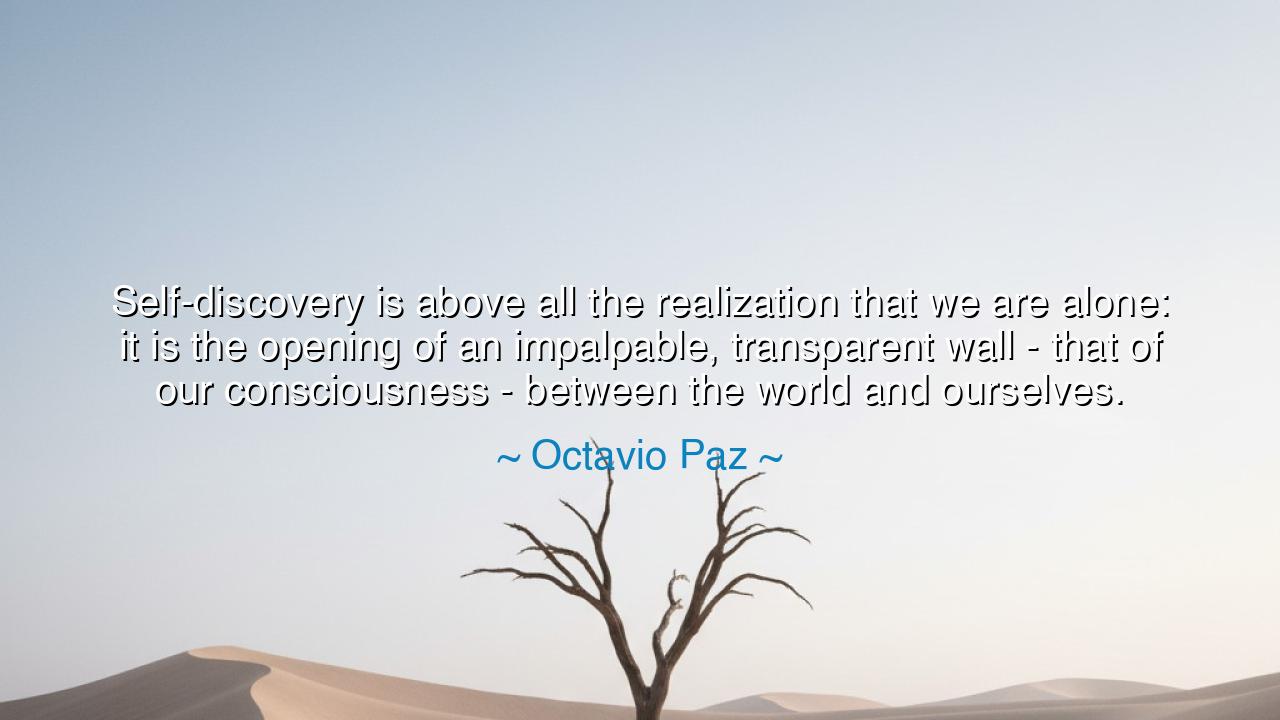
Self-discovery is above all the realization that we are alone: it
Self-discovery is above all the realization that we are alone: it is the opening of an impalpable, transparent wall - that of our consciousness - between the world and ourselves.






“Self-discovery is above all the realization that we are alone: it is the opening of an impalpable, transparent wall — that of our consciousness — between the world and ourselves.” — thus wrote Octavio Paz, the poet-philosopher of Mexico, whose words shimmer like mirrors reflecting both light and abyss. In this profound meditation, Paz reveals the paradox at the heart of awakening: that to truly know oneself is to encounter one’s own solitude. The path of self-discovery, far from being a journey toward comfort, is a pilgrimage toward awareness — the moment when we awaken and see that between the world and our soul lies a veil, delicate yet unbreakable, woven from consciousness itself.
The origin of this insight comes from Paz’s lifelong contemplation of existence, identity, and the loneliness of modern man. Living through revolution, exile, and the cultural upheavals of the twentieth century, he saw how human beings seek meaning through love, art, and community — yet remain, in their innermost depths, irrevocably alone. Paz, like the mystics of old, understood that the first step toward wisdom is not escape from solitude, but its acceptance. To discover the self is to uncover the invisible wall that separates our inner reality from the outer world — to stand before it, see it clearly, and understand that it is made of our own awareness.
When Paz speaks of “the transparent wall of consciousness,” he points to the very nature of being awake. Most men live half-asleep, carried by habit, noise, and distraction. But the moment of self-discovery is like a sudden clearing in the forest — the air becomes still, and one realizes the silent distance between the observer and the observed. It is the moment when a man looks at his own life and says, “I am.” Yet that realization, radiant as it is, brings with it a tremor — for to see oneself clearly is also to see one’s separation from the rest of the world. This is the divine irony of consciousness: it grants us understanding, but also isolation. We see everything more truly, yet can never again be entirely part of the dream.
Consider the story of Siddhartha Gautama, who left his palace to seek enlightenment. Surrounded by luxury and love, he was yet unsatisfied. When he beheld sickness, old age, and death, the wall of illusion shattered before him. Alone beneath the Bodhi tree, he faced himself — his fears, his desires, his ignorance — and there, in solitude, he awakened. The Buddha’s enlightenment was not an escape from aloneness, but its illumination. He saw that the wall Paz describes — the barrier between the world and the self — is not meant to imprison us, but to reveal that our separateness and our unity are two sides of one truth.
To realize that we are alone is not to despair, but to see clearly. For most of life, we seek to lose ourselves in others — in love, in ambition, in noise. But all these are reflections cast upon the wall of consciousness. True peace begins when we stop reaching outward and begin to listen inward, to that quiet voice which is our own. This solitude is not emptiness; it is clarity. It is the sacred space in which creation begins — for only the one who stands alone can truly encounter truth. Thus, the artist, the saint, and the philosopher all walk the same path: the road of inwardness, which leads not to isolation, but to understanding.
Yet there is tenderness in Paz’s vision. The wall he describes is “impalpable” and “transparent” — it is not a fortress, but a veil. Though we are separated from the world by consciousness, we are also connected to it through awareness. The same wall that divides us also allows us to perceive beauty, to feel compassion, to love. In recognizing our solitude, we do not reject the world — we begin to see it more truly, as something precious and fleeting. Self-discovery, then, is not the end of belonging, but its transformation: we cease to belong blindly, and begin to belong wisely.
The lesson, then, is clear: do not fear the loneliness of awakening. When you look within and feel the stillness of being alone, understand that this is not exile, but revelation. To know yourself is to stand before the wall of consciousness and see both sides — the world beyond and the soul within. Do not try to break the wall, for it is the mirror that allows you to see at all. Instead, learn to dwell near it in peace, to let your awareness flow between inner and outer worlds like light through clear glass.
So let Octavio Paz’s words guide you: “Self-discovery is above all the realization that we are alone.” Accept this solitude as sacred, for it is the birthplace of all wisdom. When you walk beneath the stars, when silence surrounds you, and you feel both small and infinite, know that this is the truth of being alive. In that stillness — where you are alone yet connected to all — you will find not despair, but freedom. For the wall that stands between you and the world is also the window through which the soul beholds eternity.






AAdministratorAdministrator
Welcome, honored guests. Please leave a comment, we will respond soon